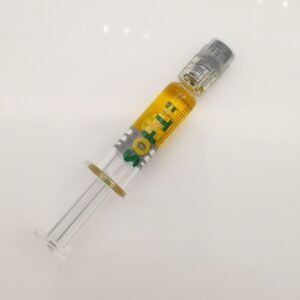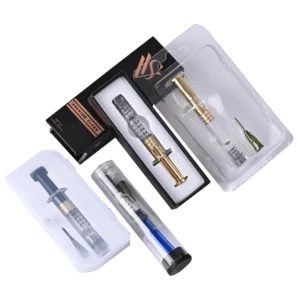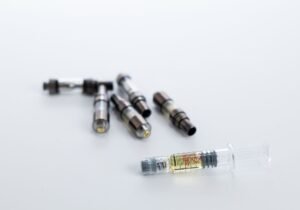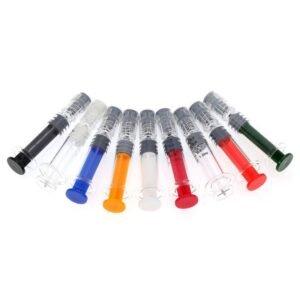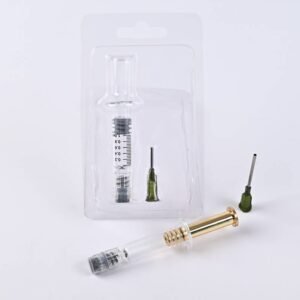Cannabis oil syringes come in various designs tailored to different extract packaging needs. Cannabis brands commonly use these syringes for dosing and dispensing extracts like THC/CBD oil, distillate, live resin, and RSO (Rick Simpson Oil). Choosing the right cannabis oil syringe involves considering its material, tip style, and how viscous the oil is. This guide reviews the main syringe categories—material, tip/lock type, and special features. It also explains which types of concentrates each syringe is best suited for.
Types of syringes for cannabis oil
Glass vs. Plastic Syringes
Glass syringes are typically made of borosilicate glass, a strong, heat-resistant material. Borosilicate glass resists thermal shock and does not warp or react with cannabis extracts. This means glass syringes won’t leach chemicals into the oil or alter its flavor. They often provide very smooth plunger action and precise dosing. Glass syringes can be sterilized and are favored for high-quality marijuana products. Hemp brands increasingly choose glass as they maintain the oil’s purity while offering stable storage.
Plastic syringes (usually polypropylene or polyethylene) are a cheaper alternative. They are lightweight, shatterproof, and have a lower cost of production. Many budget or single-use oil syringes are made of plastic, which can work well for less viscous oils. Plastic syringes are widely used for oils like RSO, partly because they are inexpensive and can be discarded after use. However, plastic can have drawbacks: some plastics may absorb terpenes over time, and they can deform if exposed to heat.
In summary:
- Glass Syringes: Non-reactive and heat-stable borosilicate glass. Ideal for preserving oil quality and precise dispensing. Heavier and more fragile, but reusable and inert.
- Plastic Syringes: Lightweight, durable, and lower cost. Often used for disposable. Less heat resistant and potentially less inert than glass, but more affordable and shatterproof.
Choosing between glass and plastic depends on product value and safety needs. Premium cannabis oils usually pair with glass syringes to convey purity, while plastic syringes are common for high-volume, budget, or single-use products.

Luer Lock vs. Slip Tip Syringes
Syringe tips come in two standard styles: Luer lock and Luer slip. A Luer connection is a universal fitting system for syringe tips. In a Luer lock syringe, the syringe tip has a threaded collar that securely screws onto a matching needle or cap. This locking connection prevents leaks and accidental separation when dispensing oil.
By contrast, a slip tip syringe (sometimes called Luer slip) simply has a smooth, tapered tip that a needle or cap is pushed onto. Slip-tip syringes attach quickly but rely on friction alone to stay in place. Luer-lock fittings were more secure under pressure, while slip tips were faster to attach but risked detachment.
In cannabis oil packaging, Luer lock syringes are very common because they form a tight seal for viscous concentrates. For example, glass dab syringes almost always come with Luer locks to prevent oil from seeping out. Many distillate syringes for vape cartridges use Luer lock fittings so that a cartridge or blunt tip can be threaded on without dripping.
Slip Tip Syringes: Push-on, taper fitting. Quick and easy to use, but less secure. Common for situations where an oil syringe can be used directly, such as a CBD oil syringe.
Luer Lock Syringes: Screw-on tip (threads) makes a leak-free seal. Ideal for high-pressure work. Most glass cannabis oil syringes use Luer-lock tips.
Silicone oil or silicone-free syringes
Glass oil syringes often include a small amount of silicone oil as a Lubricant to handle sticky extracts. There is medical-grade silicone oil less than 0.7mg on the inner barrel to reduce friction. This makes it easier to slide the plunger when dispensing thick oils. But, silicone can potentially interact with very terpene-rich extracts.
Glass syringes with standard plastic plungers cannot function properly without the presence of silicone oil. Therefore, silicone-free syringes are often offered with stainless steel (metal) plungers. Metal plungers move smoothly without grease and avoid any possible oil–lubricant reaction
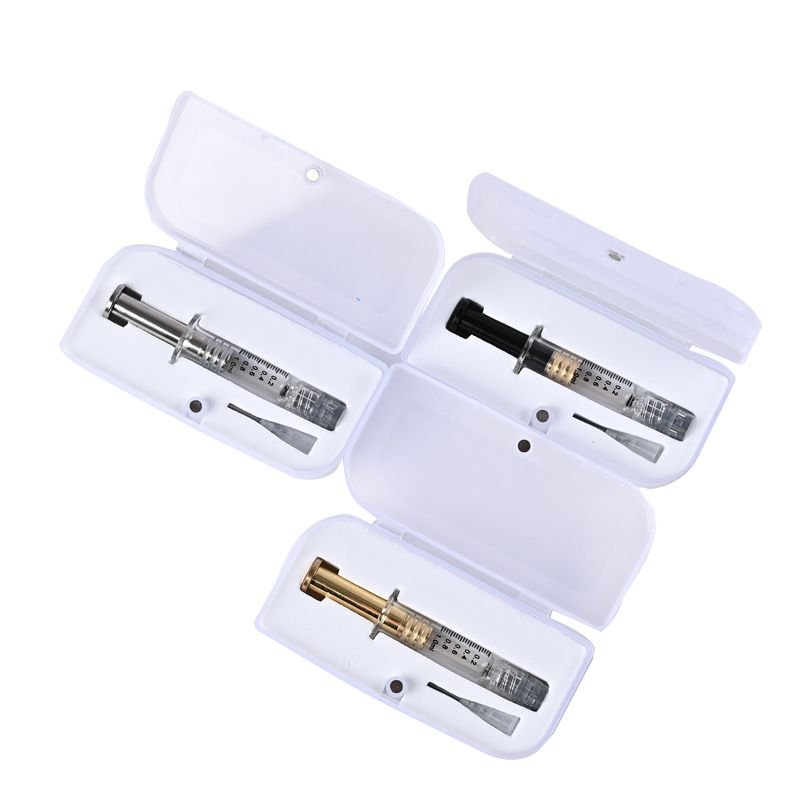
Graduations & Measurement
Syringes typically have volume markings for dosing. For example, many cannabis oil syringes are 1 mL with 0.1 mL major tick marks. High-precision syringes can even mark down to 0.025 mL increments. (Some brands calibrate 1 mL to 1 gram for oils, but always check your oil’s density.) These fine graduations help patients and producers measure exact doses. For very dark extracts (like RSO/FECO), white or high-contrast markings can make it easier to see the level.
Some cannabis oil brands use blank syringes for packaging. These allow for accurate dosing without a scale, quick and convenient. It’s important to choose different syringes based on the use case.
Use Cases by Oil Type
Different cannabis extracts call for different syringe setups. In general, syringes work best for oils that are liquid or malleable and not for hard, solid concentrates. Key use cases include:
- Thin Oils (Distillate, Tinctures): Pure THC/CBD distillate or hemp oil has low viscosity. These oils flow easily, so almost any syringe can dispense them. Luer-lock syringes with blunt tips are popular for precise dosing into vape cartridges. Graduated markings help measure exact doses of tinctures.
- Thick Oil (RSO / FECO): RSO (Rick Simpson Oil) and FECO are extremely viscous, almost tar-like. Typically, these are 1 mL borosilicate glass syringes with either a metal plunger or a plastic plunger. The syringe must withstand a lot of pushing force to dispense a dose. The glass syringe with white markings is a good option for dark-colored oils, as it allows consumers to distinguish dosages better.
Cannabis oil syringes come in various names, each reflecting their specific mode of use. Consumers can select the type that best fits their needs. Even within a single category—such as THC oil syringes—there are further distinctions based on flavor profiles and active ingredient concentrations.
Choosing the Right Cannabis Oil Syringe
Here are key factors to consider when selecting a syringe for cannabis oil:
- Material: For premium products, glass syringes preserve flavor and purity. For cost-sensitive or high-throughput needs, plastic syringes may suffice.
- Tip Style: Use Luer-lock fittings if you need a secure, leak-free seal (especially for refilling vape cartridges). Slip-tip (push-fit) syringes are simpler to use.
- Viscosity: Glass syringes with metal plungers provide more force for thicker oils. Silicone-lubricated syringes with regular plastic plungers work fine for thinner oils.
- Graduations: Pick a volume (e.g., 1 mL- 10 mL) and markings that match your dosing. Syringes with fine marks (0.05–0.1 mL) allow precise dosing.
To deliver safe, precise dosing and a smooth user experience, it’s important to match the syringe’s material, tip, and functionality to the characteristics of your oil. Always work with trusted syringe packaging suppliers and test samples to make sure the syringe aligns with your product’s needs.

